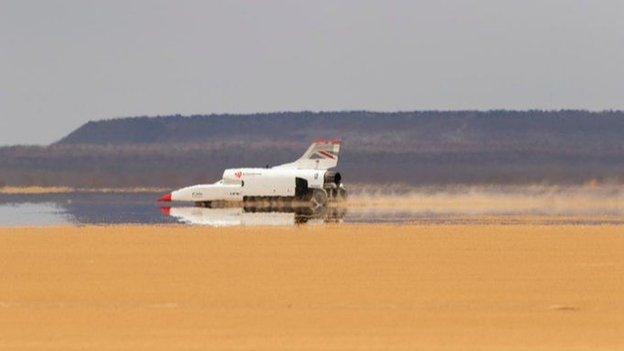Bloodhound takes first drive across the desert
- Published

The first six runs will increase the speed in 50mph steps
The Bloodhound supersonic car has completed its first drive across the Hakskeen dry lake in South Africa.
Pilot Andy Green took the jet-powered vehicle on a gentle 100mph (160km/h) shakedown test run on Friday.
Bloodhound is in Northern Cape for high-speed trials as it works towards an assault on the land speed record next year.
That mark - of 763mph (1,228km/h) - was set 22 years ago, also by Andy Green, in the Thrust SSC car.
Thrust broke the sound barrier in the process - the first, and only, car to have achieved the feat.
Allow X content?
This article contains content provided by X. We ask for your permission before anything is loaded, as they may be using cookies and other technologies. You may want to read X’s cookie policy, external and privacy policy, external before accepting. To view this content choose ‘accept and continue’.

Bloodhound will be run at progressively faster and faster speeds in the coming days as engineers seek to verify its design and the proper working of its subsystems.
With a Eurofighter jet engine onboard, it should be capable of reaching 500-600mph (800-965km/h) this year. The addition of a rocket motor in 2020 ought then to take the car over 800mph (1,290km/h).
Engineers will be looking in particular at how much drag Bloodhound is producing in these trials. This will determine the level of thrust they will need from the rocket.
They will also be checking that the parachutes and brakes can bring the car safely to a stop at the end of a high-speed run.
Up to a dozen runs are planned between now and mid November, with the first six taking the speed up in steps of 50mph (80km/h).
The desert floor has been painted to mark out an array of parallel tracks. End to end, these are about 16km (10 miles) long.
Allow X content?
This article contains content provided by X. We ask for your permission before anything is loaded, as they may be using cookies and other technologies. You may want to read X’s cookie policy, external and privacy policy, external before accepting. To view this content choose ‘accept and continue’.

The Bloodhound project is led from the UK but is being hosted by the Northern Cape government. Local people have cleared Hakskeen Pan of stones. The hope is this flat lakebed can become a draw for other racers in the future.
The trials are only happening because of the intervention of Yorkshire businessman Ian Warhurst. He rescued Bloodhound from financial collapse earlier this year and is personally underwriting the four to six-week programme.
He won't say precisely how much he's put into the project; "seven figures" is what he tells journalists. But he believes every penny to be worth it.
Mr Warhurst's calculation is that once the world sees the car running at high-speed, sponsors will come forward to carry the effort through a land speed record attempt.
Jonathan.Amos-INTERNET@bbc.co.uk, external and follow me on Twitter: @BBCAmos, external